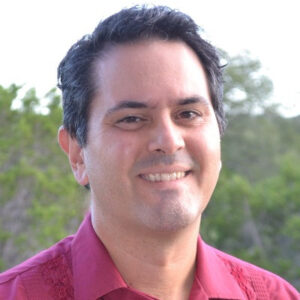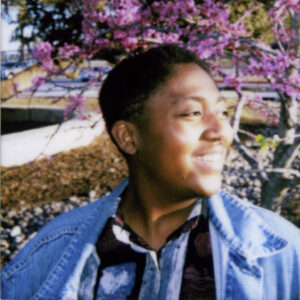
Podcast host Ike Evans speaks with two UT Austin students currently working with the Hogg Foundation’s operations department and a counselor from the UT Counseling and Mental Health Center’s Counselors in Academic Residence program (CARE) about the heightened stress students are feeling as final exams approach and the self-care tools that help them cope. Carissa Ceasor is a freshman pursuing a Rhetoric and Writing and African American Diasporic Studies double major, Montse Lopez is a third-year student majoring in Biology with a field of study in Psychology, and Tony LeBlanc is a CARE counselor embedded in the McCombs School of Business.
Content has been edited for length and clarity.
Coping with Challenges
Ike Evans: What have been the most significant challenges that you’ve encountered during your time here at UT?
Montse Lopez: I would definitely say the most significant challenge for me has been finding a community. It’s the first semester of my junior year and it’s taken me this long to find people that share the same beliefs, values, and attitudes as me. Overall, because UT is a predominately white school, it’s been harder to find a Hispanic community.
I’ve also always had bad homesickness around this time of the year, especially when I feel stressed and can barely take care of myself during finals. I would just want to go back home and that would affect my academics in a negative way.
But now that I’m in a sorority and have my sorority sisters, I feel like I have a better rhythm. I have people to go to and I have a community and I find myself being homesick a lot less. I can even say I don’t want to go back home this winter break.
Carissa Ceasor: I feel like I stuck the landing when I came to UT in the way that I intended, meaning I didn’t immediately fall on my face. And I’m proud of that. I think that’s an accomplishment.
But yeah, there has been a challenge in finding a community. I find myself scared of Black UT. It’s not for any legitimate reason. I just keep getting in my own head about things like, ‘Is my hair not good enough?’ But the parts of Black UT I’ve interacted with in a significant way have wonderful people involved, like UT BIPOC Pop. All of it has been a wonderful experience. I’m just gathering the guts to get engaged with them more. It’s something that’s really important to me, and I think that’s why the fear of failure comes in.
I’m also a really forgetful person. I have a class where the assignments have a one- or two-hour turnaround. And the number of assignments for that class I have not done…It’s really hard for my brain to stay on top of everything at every moment.
IE: What are your coping strategies? What do you do to get out of your own head?
ML: I have a tendency to shut down in stressful times and isolate myself. So, I purposely make an effort to socialize. Even if it’s just studying with another person at a coffee shop, it helps me. This semester I’ve been keeping a better balance between academics and socializing and taking care of myself.
CC: I was a military kid, so a lot of my friends are online. When I’m stuck in my head, those are the people I reach for, especially now, because I’ve known them for years. It steadies me to go back to this community that I know.
And I have to make myself get out of my dorm. Dorms are just too small. The other day, I was shocked by how much better I felt after just walking through Target and buying fruit snacks. It felt like such a breath of fresh air. It’s really easy to feel overwhelmed because UT is so big and to want to find a small safe place to stay, but getting out can make a big difference.
Communicating with Family
IE: When I was a student, I would only sometimes be really candid with my folks about what I was dealing with. Other times, I gave them a very amended picture of what was going on, usually just focusing on the academics, not the existential reality of life in college. Is that the case for you?
ML: In my freshman year I developed anxiety, but coming from a Hispanic household, that wasn’t really welcome. Mental health is not a ‘thing’ there. You’re expected to just suck it up and go with it. So, it took a lot for me to find resources for myself and not feel guilty about it or not disregard what I was feeling. Since then, I’ve utilized a lot of the UT mental health resources and found out a lot about myself.
I was also diagnosed with mental disorders, which was very new. My parents did not react the way I wanted them to. So, I stopped telling them about what I was doing. On one hand, they were undermining what I was feeling, and on the other hand they were worried about me. So, I stopped letting them know for multiple reasons.
CC: I’ve been a person who needed to be very conscious and aware of my mental health since elementary school. So, my parents got a sort of ‘crash course’ in mental health. It’s a strange conversation to navigate, though, because in my extended family it’s also not a ‘thing’. So, there’s a bubble of communication or semi-communication that we hold up.
Since middle school, I’ve also had a habit of not telling my parents anything – unless I needed to be driven somewhere. So, I don’t keep them as updated as I could about my situation, but I do have mentors aside from my parents who I tend to reach for.
Tony LeBlanc: A lot of what we’re talking about today is what I hear from students in my role as a CARE counselor.
We’ve been talking about school stress, and we’ve been talking about finals, but what’s amazing to me is how much of what we’re talking about is also not necessarily about school and finals. The stress students feel is very much about finding their identity, finding their community, finding their rhythm, finding out about whatever mental health issues need to be addressed and taken care of. It’s all this extra stuff while they’re also going to school, taking classes, and taking tests.
The things y’all are talking about are why I love being a CARE counselor at UT. This stage of life is really hard, but it’s also really magical, because y’all are doing amazing things.
Prioritizing Self-Care
IE: My worst semester as an undergraduate was supposed to have been my last semester. But I went into a pretty profound spiral because of a few different things, but mostly because my own lax habits were finally catching up to me. Toby, what advice do you have for someone in a situation like that?
TL: I would say that it’s important to focus on quality over quantity.
Whenever we’re in a stressful situation, we tend to focus on how much we have to do. We start piling on lots of hours, lots of schoolwork and trying to do it all for as long as possible. But as we do that, our minds get tired, our mental health starts to suffer, our stress levels go up, and our performance is impacted. Our focus goes down, our motivation goes down. And once that happens, we’re spiraling, because the more our motivation goes down, the less we’re able to do. And the less we’re able to do, the more stress we feel, and so on.
What I mean about focusing on quality over quantity is focusing on doing your best work. It’s important to do things that recharge you because reducing your stress level will bring the quality of your work back up.
I talk with students about building self-care into their schedule, instead of thinking of it as something to do only after studying. Instead of thinking, ‘I’ll go to Target later.’ think. ‘No, I’m going to go to Target at five this afternoon before I study because I know it clears my head.’ Or, ‘I’m going to go for a walk in the morning because I know it helps me focus when I’m in class.’
So, it’s important to focus on the quality of your work, to notice when the work is feeling good, and things are getting done. When it’s not feeling good and things are not getting done, you need to start building in time for self-care.
IE: Montse and Carissa, how are you feeling about final exams? Is it its own problem, or is it more along the lines of what you’ve already talked about?
CC: I’ve been really lucky because most of my classes this semester don’t have final exams. It could be a lot more stressful, so I’m a little bit nervous about future semesters.
But even just finishing out the semester is a lot to deal with. Taking the time to step back has kept me afloat this semester, and I’m hoping that will last until winter break.
ML: I wake up every morning and ask myself, ‘Will I finish my finals, or will my finals finish me?’ So, yeah, it’s been rough. I have to purposely take time to step back and not work sometimes because I won’t be productive if I keep going for too long.
Over time, I’ve realized that what helps me is to study with people and to treat myself after studying. That’s what’s keeping me healthy.
Identity and Mental Health
IE: How has your racial and cultural identities played a role in your mental health at UT?
ML: I definitely attribute a lot of my mental health issues to me not going out and finding people like me. I knew there were organizations and people out there like me, but my anxiety wouldn’t let me meet new people. I’d think, ‘What if I’m not Mexican enough? What if they think I’m weird?’. And that stuck with me for a long time.
Finally, after two years of therapy, I’ve gained the courage to go out and meet people, and I don’t regret it at all.
CC: Yeah, it’s been interesting. One of the things I’ve been trying to do socially is to stop masking so much. I’ve been trying to just ‘be me’ in the way that I want to be me and let other people take it or leave it. I’ve found that it invites people who also just want to relax, and it’s been really nice.
One thing, identity-wise, that I didn’t anticipate was wondering whether I’m an adult. It’s been nice to find people my age, who are handling adult things. There’s probably a spectrum of ‘adulty-ness,’ but we’re getting really close. I have a job. I’ll pay taxes this year. That’s pretty adulty. So, it feels like I have the right to claim an identity as an adult in a way that I didn’t before.
ML: I agree with Carissa. I consider myself a baby adult. One year my parents made me lunch and drove me everywhere. The next year, they’re dumping me off here and I have to figure out everything myself.
And I’ve got to give myself a little bit of credit because I have a job, I’m active in organizations, I go to school full-time, I pay my rent, I cook for myself, I clean for myself. I have to do all these things that my parents used to do for me. This is a big shift. It’s difficult, but I have to remember that it’s my first rodeo. I still have to learn a lot of things.
Managing Stress Preventively
IE: Toby, what general tips and advice do you find yourself giving to students during this time of year?
TL: I think you have to double down on scheduling time for yourself, taking deliberate actions to let yourself relax, whether it’s a big thing like staying in bed all weekend because you haven’t gotten enough sleep, or something small like stepping away from studying for a couple of hours to make dinner.
The thing I find myself talking about the most with students is just making sure that you’re taking breaks. Remind yourself that you’re a human and you have limits. Your brain is an organ in your body and gets tired like every other organ. Your job is to respect it when it gets tired so it can rest and recuperate.
Also try to be preventive. Sometimes when you’re reactive, it’s too late. For example, waiting until you’re totally stressed out and on the verge of a panic attack is not when you do anxiety prevention.
We’re All Still Learning

Toby Leblanc
IE: Have you noticed a shift over your time as a counselor in the quantity or quality of mental health support that you’re being asked to provide?
TL: I’m in my fifteenth year of being a CARE counselor at UT and I’ve noticed that the pressure on students seems to be going up. Students are feeling increasing pressure to achieve, to be the best, to do as much as they can, to get as far as they can, and to do it as fast as they can.
I see students who feel like no matter where they are, even if they’re out in front, they’re falling behind, and they should be doing more. I spend time debunking that way of thinking with students. We take time to stop and look at all the ways they’re adulting and how much they’ve progressed in just the short time that they’ve been here.
We also spend time debunking the idea that ‘Eventually we’ll have it all together and everything will make sense,” and the idea that if it doesn’t all make sense right now, we’re failing or we’re falling behind. In reality, as a card-carrying adult, I’m still getting it together. I’m still figuring it out. That’s something that I talk about a lot with students, that we’re all still learning.
Even when you feel like you should have arrived, you’re still arriving.
ML: A lot of my stress comes from feeling like time is running out. In my head, I’ll think, ‘I’m practically 40. I should already have everything together. I should already have my life together. Why am I not looking at houses to buy right now?’ Silly stuff like that. And I haven’t even graduated college yet!
It’s important to remember that there is no single destination. I guess everyone’s going to end up in the place that will work best for them.
CC: I recently said to mentor of mine, ‘I don’t know if I am an adult or when I should be an adult.’ She said, ‘Girl, you’re not kidding. You’re never going to get there.’ And it was really reassuring to hear.
Coming up through grade school and college, every milestone feels like checking a box. It’s very achievement based. Then, coming to college there’s nobody to tell you how good you’ve done or what you’ve done well. One of my biggest stressors was not being able to see my grades all the time. I had no idea how I was doing in half of my classes.
You have to just choose a direction and keep walking. I think it’s something that you grow into a little bit. You don’t grow out of the difficulty. You just grow into being aware that it’s going to be difficult.
Related Content
- Into the Fold, Episode 60: Mental Health in the College Classroom
- Into the Fold, Episode 125: A New Deal for Youth
- Voices of Students in Crisis
- Breaking Barriers at the Steve Hicks School


